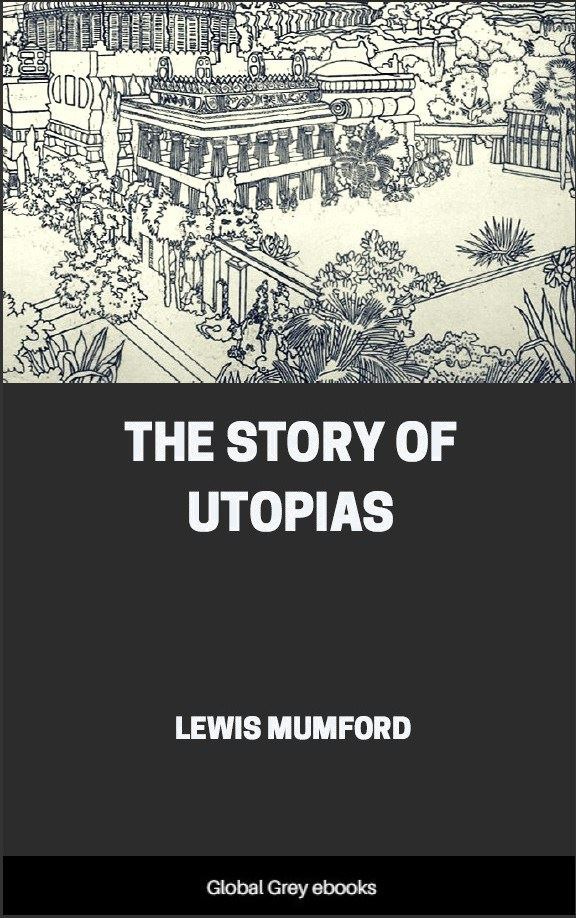To Construct A Utopia: Plato
Sloth's comment on The Story of Utopias by Lewis Mumford
Let us first speak of how Sloth arrived here. After starting his own Substack publication, and attempting to foster the community, Sloth encountered two vital questions:
How do we not err again?
If people are more foolish nowadays, and most education is indoctrination, how much wisdom has been banished from us?
Thus began Sloth's quest through many old texts in the Public Domain (the older the better). To build a new age, one must learn from the wise men of the past; men, forgotten by history, who cast their light into the future to teach.
And perhaps it shall aid Sloth in crafting his own fiction.
The Story of Utopias by Lewis Mumford is one such book. The work explores the construction of the ideal paradise/nation/city where people might live happily, from philosophers such as Platos. It perfectly encapsulates the arc of time, while in its shadow revealing the vanity of the modern age.
On Plato’s Avilion
Background
According to Mumford, Plato's Utopia is that of a "shepherd" and "sheep". Starting from the ground up, Lewis constructs his Plato's utopia on the hypothetical "island of Avilion."
Avilion was geographically situated in a "valley section" with evergreen trees on its summit, fertile bottom lands for crop cultivation leading to the sea, and moderate climate. This ideal setting eliminated the greatest thorn in utopia construction: labor scarcity. The abundant nature of the land and humanity's harmonious coexistence with it ensured that diligent farming could sustain the community.
Mumford noted one key distinction between Plato's view and our modern perspective: population distribution. The commonwealth is actively shared within his community, not sprawling across vast lands. Under this lens, Plato's Avilion is best understood as an ideal city-state.
Mumford then explored Plato's economic model: "The Good was what necessary; and what was necessary was not, essentially many goods." His logic is simple: to satisfy bottomless demand, resources and borders must expand, making war inevitable. Thus Avilion sought life that was neither "impoverished nor luxurious"; instead, they aspired to live like "good farmers or good philosophers" rather than emulating "vulgar gamblers." This wisdom resonates with Buddha's Middle Way - both philosophers saw extreme poverty and luxury as corrupting human character.
"for one is the parent of luxury and indolence, and the other of meanness and viciousness, and both of discontent"
Happiness, for Plato, lay in dedication to the act of living rather than what "could be looted out of it," finding joy in action rather than limitless consumption. If our modern world of excess and greed was a "heavy fragrance of rose petal," Avilion is one of "crushed mint," "morning grass," and "marjoram."
Plato's Avilion is limited to "5040," a number that can be addressed by a single orator. Clearly, Plato sought not to create a mammoth state but a content one easily governed. This community was bound together by shared education.
The Plato’s Uniqueness
Unlike other Utopians, Plato, as perhaps the oldest philosopher, never confused commercial with civic unity. His concern was the pursuit of an ideal paradise where people could live together harmoniously.
His solution: "the principle of function." Plato accepted people's differences, and thus maximum "goodness and happiness" (equivalent in his mind) meant living up to one's potential: knowing yourself, finding your talent, and employing that calling for both communal benefit and personal happiness.
Mumford compares Plato's view of the state to that of health; a perspective which resonates with modern discussions of societal wellbeing, including those by figures like RFK Jr.
"Health is the creation of a natural order and government in the parts of the body, and the creation of disease is the creation of a state of things in which they are at variance with the natural order"
Thus Plato answered his major problem with a solution that should prove the ancients knew their craft:
"a place for every man and every man in his place"
Mumford noted that while Plato recognized other forms of happiness, this compromise was chosen for the maximum happiness of the commonwealth, preventing the ship from capsizing by benefiting one group too much.
But Even the Wise is Not Perfect
Plato was a product of his time, thus his Utopia structured around a class system based on human virtues:
Guardian (Wisdom): Ruler class
Auxiliaries (Valor): Military class
Worker
Temperance united all classes, with Justice as the ultimate source of virtue.
To Plato's credit, he rejected hereditary rule. As shown before, he believed people were born with particular inclinations. The challenge became: how to match people to their proper class?
Plato's solution was, to use modern term, radical: "departure" from institutions like "individual marriage and individual property."
Yes, you read it right. Plato contemplate communism before Marx and he did it with more nuance than “eat the rich”. Unlike Marx, Plato respected his era's apprenticeship system of his time and value in pursuing their inclined vocation. To maintain his constitution, he proposed the usage of “breeding, education and discipline.”
Hence, we will now explore the class
The Worker Class
Mumford largely dismissed this class from analysis, noting Plato's minimal concern. Those content to mind their business posed little threat. Whether Plato's radical policies extended to workers remains unclear, but he believed a rogue craftsman posed minimal risk.
The real danger lay elsewhere:
"...the guardian of the law and the state are not so in reality, but only in appearance, you see how they entirely destroy the whole constitution, if they alone have the privilege of an affluent and happy life"
Instead of targeting worker, Plato identified the "greatest point of danger" as the "statesman."
The Auxiliaries
This military class "dwelt by themselves in a single enclosure; and had common meals and common temples of their own."
Notably, "women were permitted an equal place with men in the life of the camp and the gymnasium and the academy" with differences only in "matter of breeding and selection."
Guardian
Now to the class Plato scrutinized most deeply.
The children of Guardian ("gold") and Auxiliary ("silver") could sometimes produce children of husbandmen and craftsmen ("brass") and vice versa, thus:
"...the eye of the ruler must not be pitiful toward his child because he has to descend in the scale and will become husbandman or artisan, just as there may be others sprung from the artisan class who are raised to honor, and become guardian and auxiliaries"
To safeguard this principle, Plato proposed a "system of common marriage" (farewell to one-true-love and nuclear family):
"The wives of these guardians are to be common, and their children are also common, and no parent is to know his own child, nor any child his parent."
Children born in the same period are treated as siblings (preventing incest). Men call all children born 7-10 months after marriage their "sons" and "daughters"; they in turn call him "father." The most eugenically sound - smartest and most beautiful - are encouraged to produce more children. Guardians have "complete freedom of sexual selection," with great service earning them more privileges.
Mumford noted that Plato wasn't a complete eugenicist, acknowledging its inconsistencies. Children must prove themselves worthy of guardian status. Those who fail, through physical or mental disability, join the "discard" pile.
But breeding is only half the equation - training completes it. For Plato, education should mold every aspect of life.
Human biology and sociology, Plato accepted, form the biological life. People naturally create small circles of friends for warmth and unity - a wholesome image. However, as Mumford put it, the good is "frequently the enemy of the better". Group loyalty is "sapped by the demands made by family ties and sentimentalities."
To be a guardian is to leave family bonds behind.
Guardians of both sexes begin education through play in "music and gymnastic," approaching these subjects formally in adulthood. Students face constant testing for tenacity and keenness - only those who pass become guardians.
Guardians live in common barracks. None may "possess any substance privately, unless there be a great necessity for it." Private property is forbidden, including gold and silver, as they don't need it.
Plato created these restrictions to form a detached ruling class focused solely on governance. Property and wealth would make them active participants, vulnerable to corruption.
The guardian's role isn't to make regulations; markets and tradesmen handle that. Trying to reform "dishonesty and rascality of mankind" would be like trying to "cut away the heads of hydra." Their job is perfecting the state's constitution through breeding, vocational selection, and education - essentially, perfecting Avilion through generations of education and eugenics.
Sloth's Evaluation
Plato effectively identified statesmen's power and ideal education model in shaping life. His views on natural preference of occupation resonate with Sloth's beliefs.
However, as Mumford noted, Plato had a critical flaw: "Literature and music, in order to contribute to the noble education of the Guardians, are both severely restricted in theme and in treatment." He "feared the emotions as a tight-rope walker fears the winds."
This flaw undermines his utopia. Avilion becomes a city-state led by Jedi-like guardians who, like Mace Windu, claim detachment while harboring deep attachments they refuse to acknowledge. Their suppression of emotion stems from fear; a weakness which blinds them to reality until destruction arrives. Like many ancient philosophers, Plato tried subduing chaos with temperance, but chaos shall not be denied. From passion, humans derive strength and drive to face insurmountable odds. Leaders who deny their emotions, rather than understand them, cannot truly lead. Human nature isn't perfectible; it's not survival of the fittest but survival of BEST FIT.
Because of Plato's restrictions, Avilion would likely collapse within a century, whether from new materials or key mistakes its guardians - through their emotional neutering - couldn't foresee. Like the Jedi Order, they would grow disconnected from those they govern, never seeing the brewing storm until it's too late. Humans are selfish creatures. Those who cover in fear of their inner darkness instead of accepting it will not be able to change or adapt.
Ultimately, Plato's world would fossilize as things progress, growing dogmatic and staunchly rigid until someone nuked the sense back into it like Japan.
But at least, Plato still had harmony at heart, even when harmony is the opposite of what humanity is. Alas, the same couldn't be said for other Utopians.






